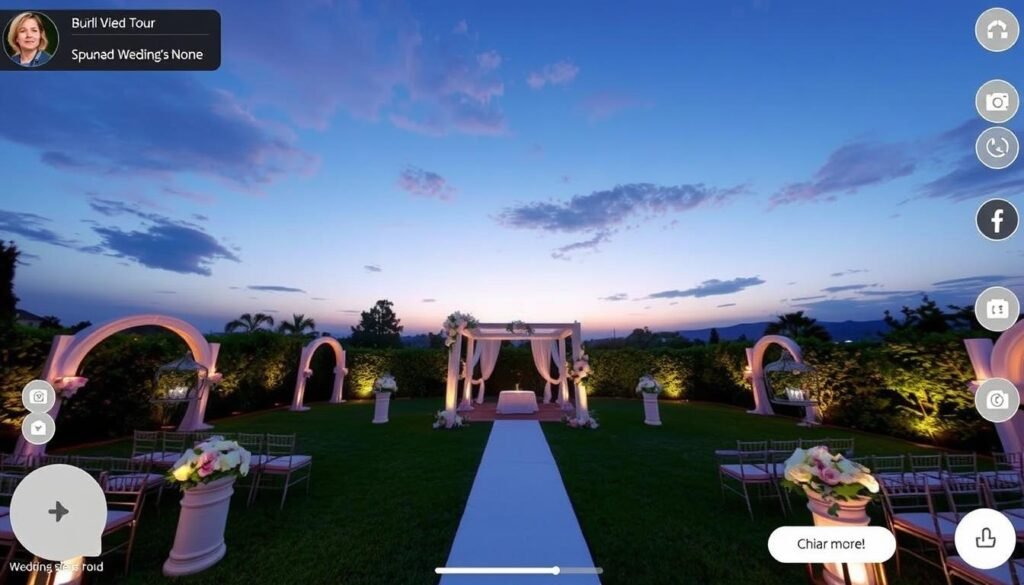The way we communicate has changed a lot. New tech has made sharing information easier, especially for wedding planning.
Couples now use digital tools to plan their weddings. This has created new ways to make wedding plans personal.
Online tools and social media help couples plan dream weddings. This change offers new chances for wedding pros and content makers.
Understanding the Evolution of Communication
Communication has been vital to human society since ancient times. It has changed from oral traditions to today’s digital world.
These changes reflect cultural shifts and technological advances. They have shaped our world and impacted various industries, including weddings.
In the past, wedding planning relied on word-of-mouth. Written invitations later allowed for more formal and widespread communication.
Mass-produced wedding materials came next. These included programs, menus, and place cards.
The digital age has changed how couples plan weddings. Email, online RSVPs, and wedding websites have made communication easier.
This shift has also affected cultural expectations. Many couples now include digital elements in their wedding traditions.
Please visit for more free credit no deposit.
The Digital Transformation in Communication
The digital revolution has changed how we plan weddings. Couples now have many online tools for wedding planning.
These tools include virtual vendor meetings and social media inspiration. The internet is now key in modern wedding planning.
Websites and apps offer all-in-one wedding planning solutions. Couples can research, book services, and manage guest lists online.
These online resources let couples customize their wedding plans. They can shape every part to fit their unique ideas.
Social media shapes wedding trends and ideas. Couples find inspiration from real weddings on Instagram and Pinterest.
This leads to more personal, visually stunning weddings. Couples aim to create photo-worthy events for their guests.
Social media helps wedding vendors too. They can show their work and connect with couples easily.
Digital tools have changed the wedding industry. Couples can now plan their perfect day with more ease.
Key Components of Today’s Communication Environment
Wedding apps have changed how couples plan their big day. These tools help organize vendors, RSVPs, and event schedules easily.
Couples can access lots of info and resources on their phones. This makes planning much simpler and faster.
Mobile planning tools are now vital for wedding communication. They allow quick chats between coordinators and clients.
These platforms help share ideas and make last-minute changes. They’ve become essential for smooth wedding planning.
Instant messaging has greatly improved the wedding industry. Couples and coordinators can now make quick decisions easily.
This ensures every part of the wedding day goes perfectly. Communication is key to a successful event.
The Role of Social Media in Communication
Social media is now crucial for wedding planning. Couples use wedding hashtags to help guests share and enjoy the event.
Influencer partnerships are popular for creating picture-perfect weddings. They use the reach of influential people on social media.
Social media brings new challenges in managing client expectations. Couples often want flawless weddings like those they see online.
Wedding pros must balance social media etiquette with meaningful experiences. They need to deliver memorable events for their clients.
Social media’s role in wedding communication keeps growing. Pros must understand trends and manage client expectations well.
By using social media, wedding pros can improve the experience. They can create lasting memories that go beyond the digital world.
Emerging Trends Shaping Communication
New tech is changing how we plan weddings. AI tools help couples with every step of the process.
Virtual tours let couples see venues without visiting in person. This helps them make better choices.

Blockchain is making wedding payments and contracts safer. It helps manage deposits and vendor payments securely.
These new trends are making wedding planning easier and more personal. Couples can now plan their dream weddings with more confidence.
The wedding industry is changing fast. These new tools will make weddings even more special.
The Importance of Visual Communication
Visual communication is vital in wedding planning. Couples want a captivating planning experience. Wedding pros use visual tools to deliver this.
Visual tools include stunning wedding mood boards and video consultations. These make the planning process more impactful and engaging.
Infographics and timelines are key visual tools for planners. They present complex schedules in an appealing format. Couples can easily understand and track their wedding timeline.
Visual planning tools also help share design concepts. Couples can give feedback and work on the overall look together.
Video consultations have changed how pros work with clients. Couples can see vendors’ services firsthand through virtual meetings. This builds a deeper connection between clients and vendors.
Interactive mood boards fit well into video consultations. Design presentations also work great. These create an immersive experience for couples.
Visual communication will keep growing in the wedding industry. It helps pros stand out and simplify planning. Most importantly, it creates unforgettable experiences for couples.
The Shift in Business Communication Practices
Wedding planning has changed a lot in the digital age. Virtual services are now popular, using new tools to talk with clients.
Remote planning lets couples work with vendors from home. This has led to more use of project management software.
Cloud-based file-sharing platforms help wedding pros work with clients. These tools let clients join in the planning process.
Couples can give feedback and share ideas in real-time. This builds stronger relationships between clients and vendors.
Clear communication is key in the digital world. Planners use email, video calls, and messaging to keep clients informed.
This new way of working makes planning more efficient. It creates a better experience for both clients and vendors.
As the industry grows, using these tools will be important. They help businesses meet the needs of modern couples.
The Impact of Culture on Communication
Multicultural weddings are becoming more common in the wedding industry. Understanding cultural differences is crucial for planners and couples.
Respecting all cultural traditions is a key challenge in multicultural weddings. This needs open communication and a desire to learn about family customs.
Couples must consider the ceremony, attire, food, and rituals. These details often have deep cultural meaning.
Cultural sensitivity is vital in the global wedding industry. Planners must know the latest trends and adapt to diverse client needs.
Understanding helps create inclusive and memorable wedding experiences. It also promotes cross-cultural appreciation and connections in the industry.
The Future of Communication
The future of communication is exciting and dynamic. Technology has revolutionized wedding planning with innovative tools and digital integration.
Wedding coordinators use new methods to streamline planning. They aim to deliver a seamless experience for couples.
Virtual and augmented reality are changing wedding planning. Couples can explore venues and try on virtual attire from home.
Digital tools make wedding planning more efficient and personal. Couples can collaborate with vendors in real-time using these platforms.
Wedding coordinators now use data-driven insights to improve their services. They can better anticipate couples’ needs and optimize vendor coordination.
Technology and human expertise combine to redefine wedding planning standards. This allows couples to focus on celebrating their special day.
The wedding industry continues to change and grow. Technology and personalized service work together to make dream weddings easier.
Improving Communication Skills in a Digital Age
Communication skills are crucial in our fast-paced digital world. We need to master digital etiquette and virtual communication skills.
These skills help us build meaningful connections online. They also allow us to deliver great service to our clients.
Active listening is key in virtual communication. Focus on your clients and ask thoughtful questions.
Show genuine interest in their needs and concerns. This helps build trust and understanding.
Empathy is vital for strong online client relationships. Try to understand your clients’ motivations and challenges.
Use technology to create personalized experiences. Tailor your communication style to each client’s needs.

